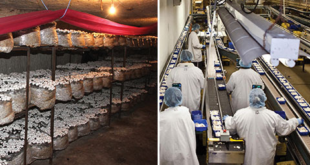What African govts should do to boost agriculture?
12th March 2018
African governments, together with banking institutions operating in African countries, must develop a financing model that replaces land as collateral.
By Moses Hategeka
‘Our son, our farms’ soil fertility has for years been drastically declining and so are our farms yields and thus we are poor, food insecure and unable to feed our families well.”
We have no collateral to access credit to enable us, purchase fertilisers, inputs, and agricultural equipment like walking tractors for use in tilling our lands. As you can see, most of us are elderly and less energetic, yet the traditional tools we currently use require energetic and young people, who unfortunately have all run to cities in search of better income generating jobs/businesses” says, a group of women smallholder farmers, in Karonga district, Malawi, during our practical on-farm training workshop that included training farmers in the district in modern tilling, planting and fertiliser application techniques.
When asked what makes it difficult for them to access credit, their leader responded: “The patriarchal setup of our society and cultural norms here, are discriminative, as they do not allow women to own land.
She went on to say: Women here do not own the land on which they farm and, therefore, cannot present land as collateral to seek credit from banks.”
The average age of smallholder farmers in Africa is 65, implying that the smallholder farming is dominated by the old, who in most cases, are traditionally oriented and find it hard to easily grasp and adopt modern farming techniques.
Agricultural policy makers in Africa must begin addressing questions such as “Why is it that the agricultural sector in Africa is not attractive to the youth and what can be done to make farming enjoyable and profitable to the youth?
This bleak situation is prevailing in all African countries and needs to be resolved, if African countries are to attain rural transformation and sustainable development that is all inclusive, factoring in the fact that, agriculture in Africa is dominated by smallholder farmers.
Smallholder farmers in Africa need money to acquire suitable new agricultural technologies to boost their farm yields, but continue to face huge dilemma in accessing agricultural credit financing. This is due to lack of collateral and the matter is made worse by traditional norms in some communities, where land is communally owned and one cannot claim ownership over it and cannot, therefore, present it anywhere to seek agricultural financing loan.
But let us ask ourselves a question. Why is it that African countries have failed and are still failing to develop an agricultural financing model to replace land as collateral and what needs to be done?
I have extensively traveled in rural communities of several African countries, especially, Eastern, Southern and Western African countries, training smallholder farmers, in new evolving methods of profitable farming and practically witnessed, the absence of agricultural technologies, knowledge transfer and lack of access to credit, predicaments which the smallholder farmers are facing. This scenario is making it hard for them to jump out of food insecurity and the poverty trap.
What then needs to be done? African governments, together with banking institutions operating in African countries, must develop a financing model that replaces land as collateral, which would be like in form of the governments depositing an evolving agricultural development fund, in selected banking institutions, for disbursement on an interest free basis, to mapped out smallholder farmers, who on after harvesting and selling their produce, must return back, the interest-free borrowed funds to these selected banks.
This must be done hand-in-hand with governments organising smallholder farmers into co-operatives and giving them production enhancement morale, initially, for example, by constructing for them postharvest storage and small scale value-addition facilities. This will make them not only avoid postharvest losses, but to also be in better position to negotiate for better prices for their produce.
African governments, must also persuade global leading manufacturers of agricultural equipment like AGCO, John Deere CLAAS, among others, to begin producing products for smallholder farmers too and not only for large-scale farmers, who for decades have been and still are their main target market. African smallholder farmers need suitable equipment such as, A70-100 PS tractors and not A600 PS tractors.
One year back, while on a practical field learning tour of, CLAAS factory, one of the world’s leading manufacturers of Agricultural machinery, with corporate headquarters in Harsewinkel, Westphalia, Germany, with production facilities worldwide, in countries such as, Hungary, Nebraska, US, Southern Russia, India, and China, I only witnessed monster agricultural machinery, suitable only for large-scale farming.
However, the good news is that these global agricultural equipment manufacturing brands have all set foot in African countries and have appreciated the need to start producing products for smallholder farmers too and some are in fact, producing walking tractors, which a few small-scale farmers are finding easy to use in boosting their production.
These walking tractors are still out-of-reach for millions of smallholder farmers in Africa and the onus is, therefore, on African governments to develop a funding model that will enable their smallholder farmers to get these much needed suitable equipment.
In sum, the skyrocketing Africa’ population, which is expected to double from current 1.2 billion to 2.4 billion people by 2050, necessitates that the continent, must devise food production strategies, that will rapidly result in massive production of food on a sustainable basis, in the next 20 years.
Failure of which, will leave a greater percentage of its people trapped in food insecurity and poverty scenario, with resultant impact of widened unrest, wars and crime increase and to avert such catastrophes, African governments should do whatever it takes to help its smallholders farmers access suitable equipment and inputs to boost their farm yields.
MOSES HATEGEKA
Ugandan based independent governance researcher, public affairs analyst and writer
 THE GLOBAL WINDOW OF TURKISH FOOD AND AGRICULTURE The Global Window of Turkish Food and Agriculture Sector
THE GLOBAL WINDOW OF TURKISH FOOD AND AGRICULTURE The Global Window of Turkish Food and Agriculture Sector









